
«Women of Eger» Bertalan Székely (1867)
The siege of Eger (Hungary Kingdom) in 1552 is a very good example of how the strongers don´t win always by brute force and can´t impose them tyranny: Women were heroines and help the defence of the Castle against Ottoman will of power! 2200 Hungarians defeated 37500 Ottomans. A message for all times ...

«Siege of Eger» Zala György
Another great work of the same artist was «Statue of Liberty» in Arad (Romania):


«Statuia Libertății» Zala György (1890)
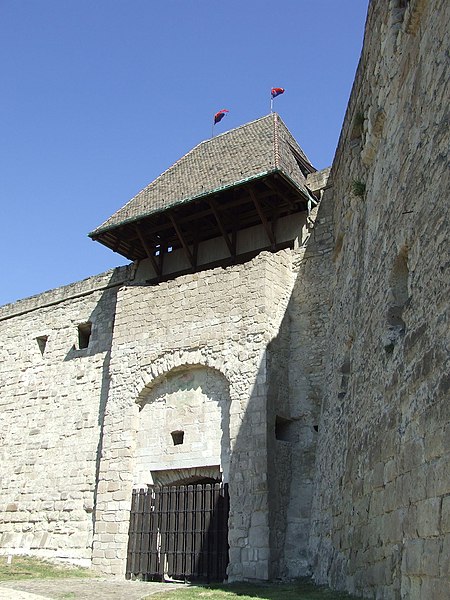


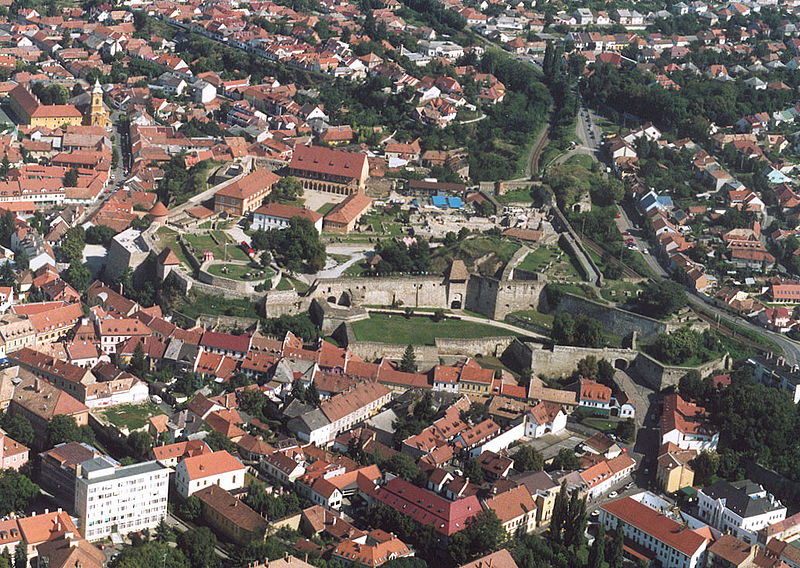
Aerial view of the Castel of Eger - Civertan (Wikipedia) http://creativecommons.org/licenses/by-sa/2.5/deed.en
More later Eger fall in an Otoman siege launched in 1596.
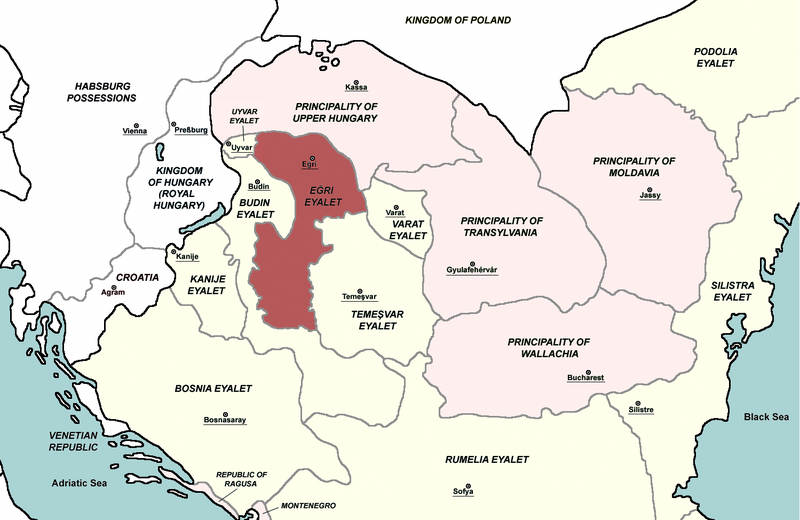
«Egri Eyalet in 1683. Tributary states of the Ottoman Empire are shown in pink» by PANONIAN (Wikipedia) http://creativecommons.org/publicdomain/zero/1.0/deed.en
Celts and Dacians ...

«I popoli della Pannonia prima della conquista romana (I secolo a.C.)» Cristiano64 (Wikipedia)
Begining in 35 b.C the Roman influence, Romans undercontrol PANONNIA in 9 a.C. after defeated Panonians and Dalmatians rebellion. PANONNIA means water, wet, the Panonnian Basin of the old Pannonian Sea
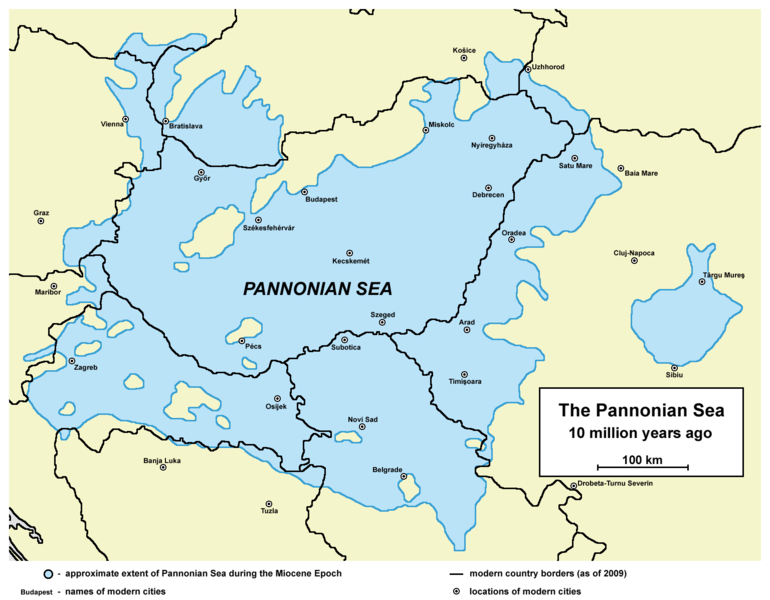
Pannonian Sea by PANONNIAN (Wikipedia)
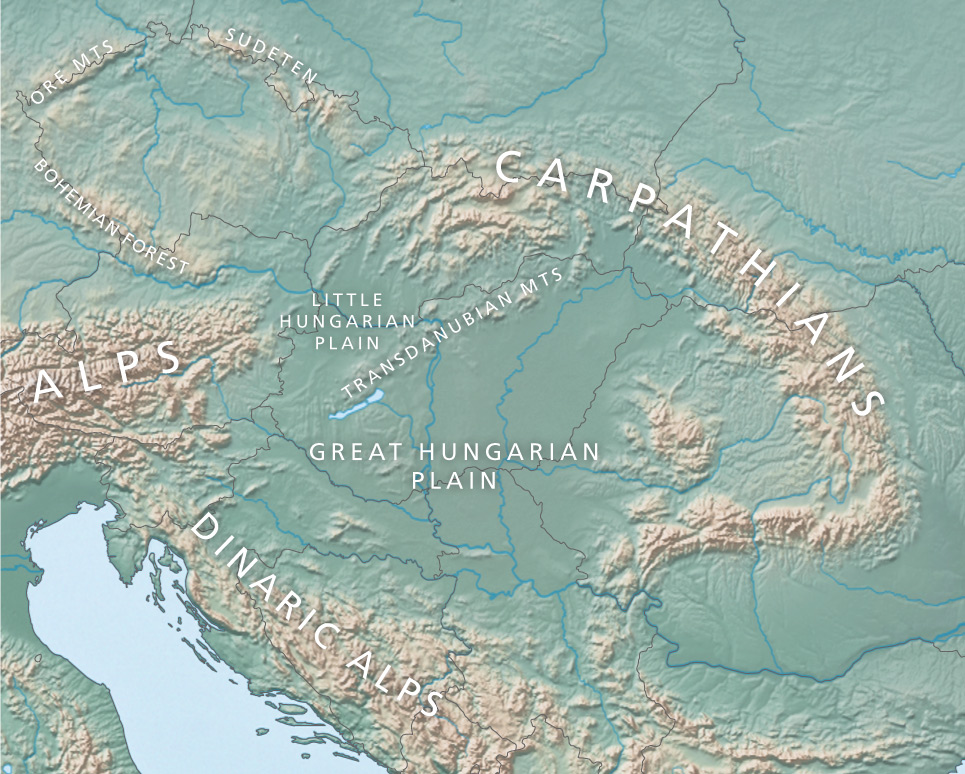
Panonnian Basin by Koba-chan (Wikipedia) http://creativecommons.org/licenses/by-sa/3.0/deed.en
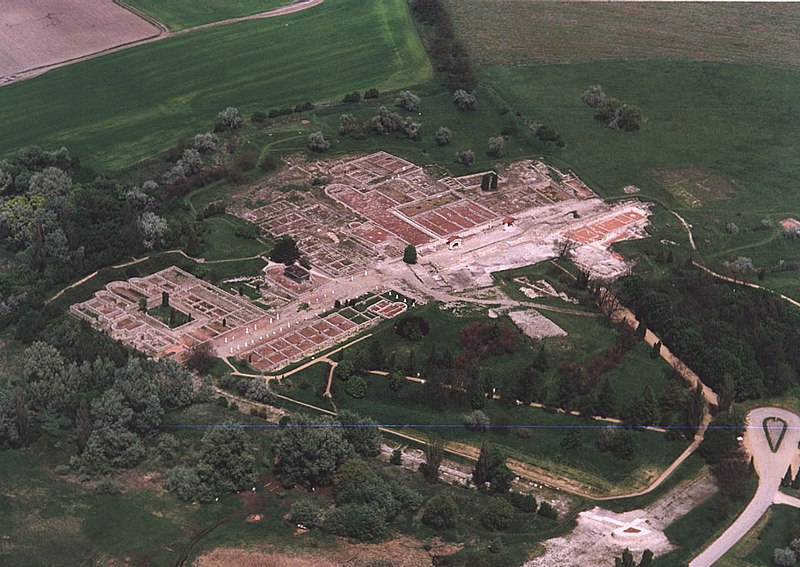
GORSIUM in a an aerial photo of Civertan (Wikipedia) http://creativecommons.org/licenses/by-sa/2.5/deed.en
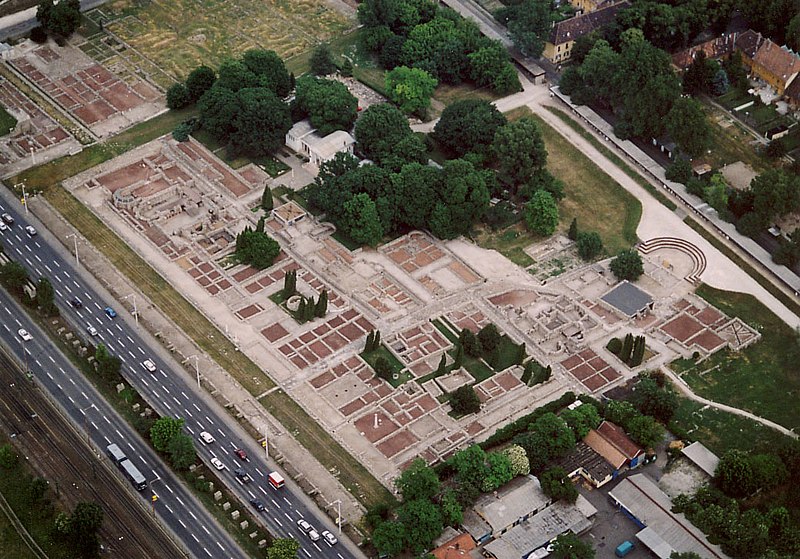
AQUINCUM, now Budapest in a an aerial photo of Civertan (Wikipedia) http://creativecommons.org/licenses/by-sa/2.5/deed.en


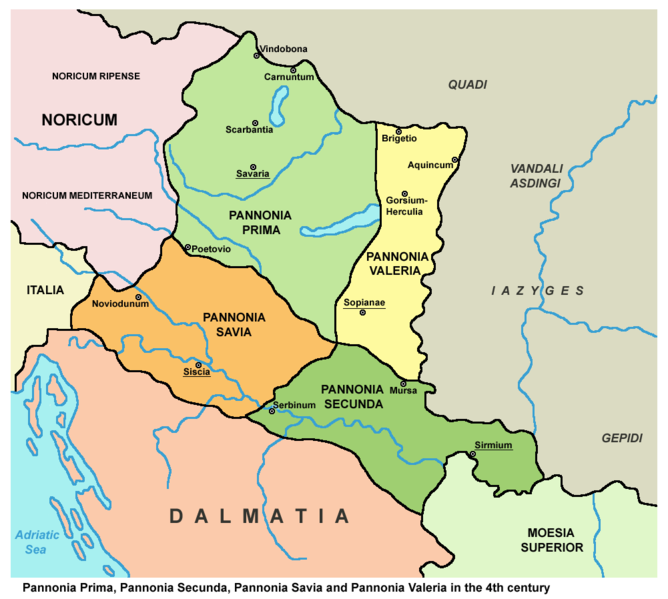
«Pannonia» by PANONIAN (Wikipedia) http://creativecommons.org/publicdomain/zero/1.0/deed.en
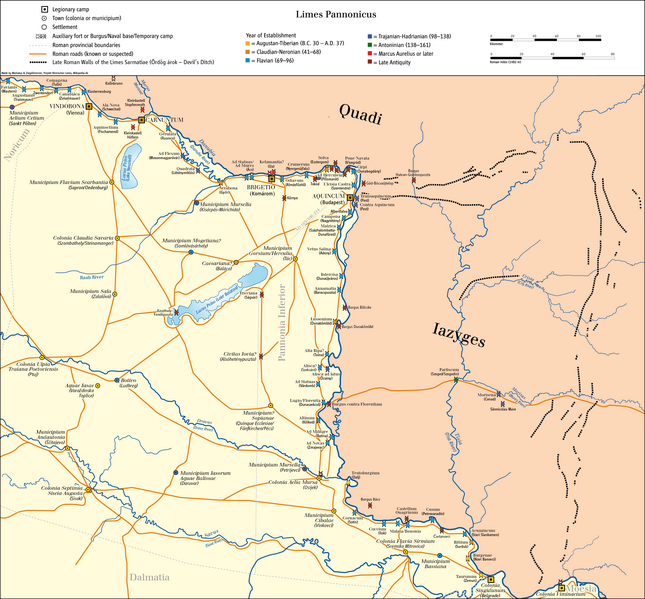
Panonian limes in «Project Roman Limes» by Mediatus and Ziegelbrenner (Wikipedia) http://creativecommons.org/licenses/by-sa/3.0/deed.en

«Balkans 850 d.C.» Hxseek (Wikipedia) http://creativecommons.org/licenses/by-sa/3.0/deed.en
Hungarians tribes conquer the Panonnian Basin in 900 a.C.
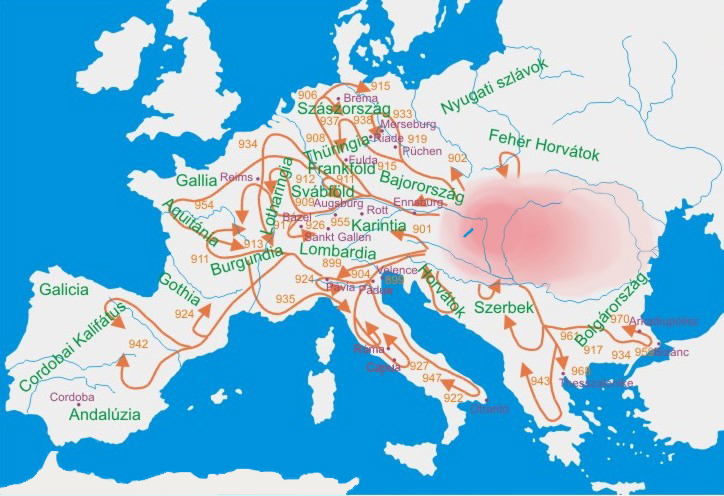
Hungarian campaigns of X century by Csnády (Wikipedia) http://creativecommons.org/licenses/by-sa/3.0/deed.en

«Hungary in the last decade of the 11th century» Fz22 (Wikipedia)
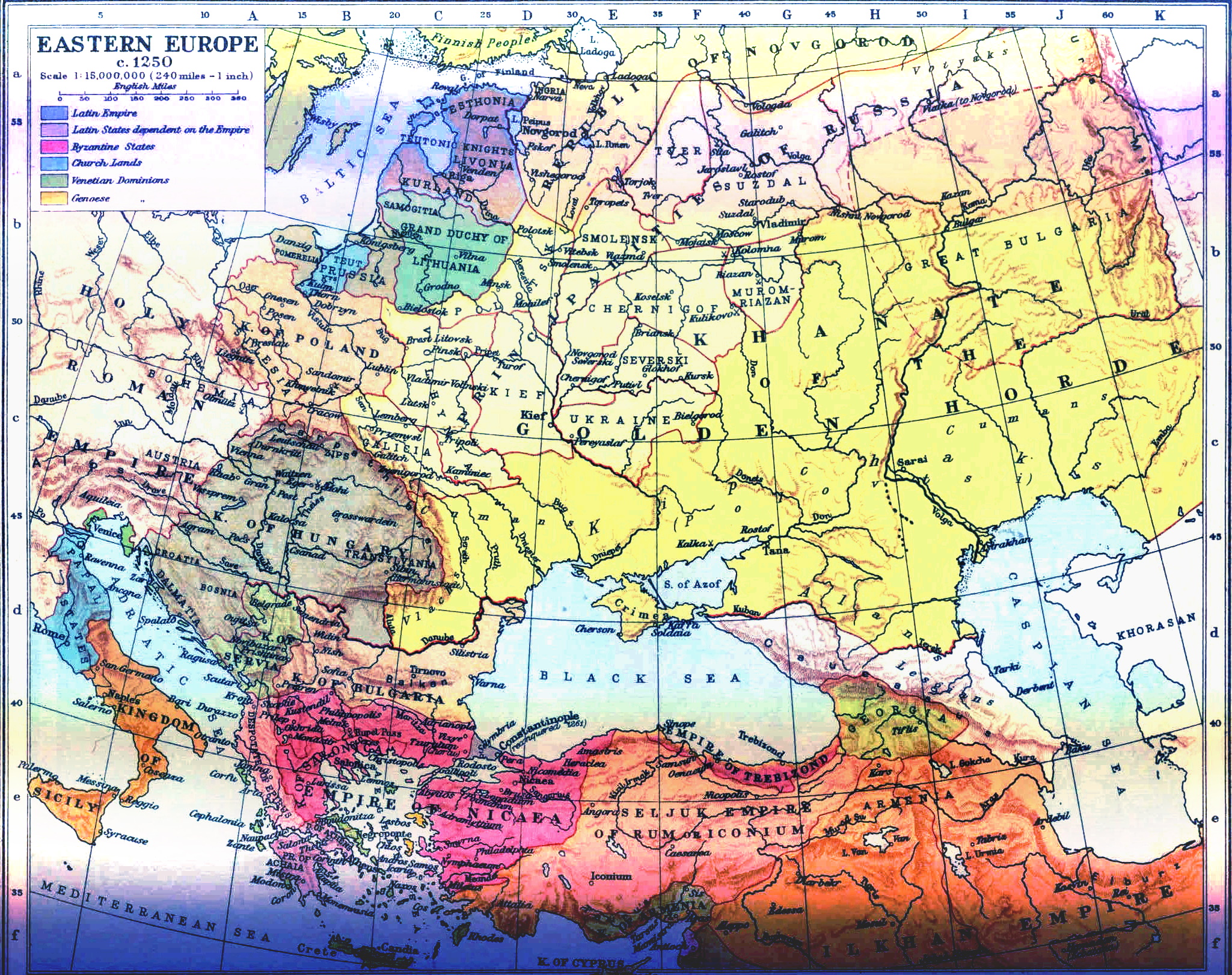
«Eastern Europe around 1250» Ramsey Muir «Historical Atlas--Mediaeval and Modern» (London, 1911)

«Lands, countries and kingdoms under Louis the Great's rule in the middle of the 14th century» József Homolka (1890)

«King László V and Ulrik Cillei» Bertalan Székely (1870)

«Map showing the direction of attacks in/of Hungary and in/of the surrounding countries in the middle of 15th century concentrating on the Black Army of Hungary» Viztarp/Alex D: (Wikipedia) http://creativecommons.org/licenses/by/3.0/
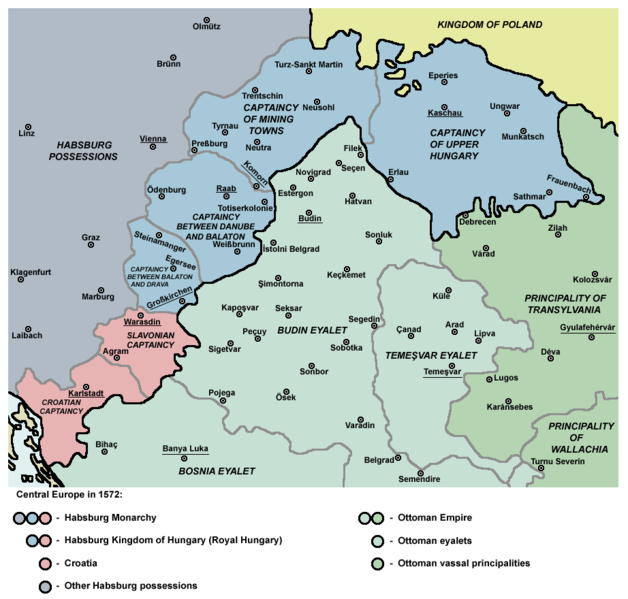
«Map of Central Europe in 1572: Habsburg Kingdom of Hungary (Royal Hungary), Habsburg Croatia, Ottoman Budin Eyalet, Ottoman Temeşvar Eyalet»
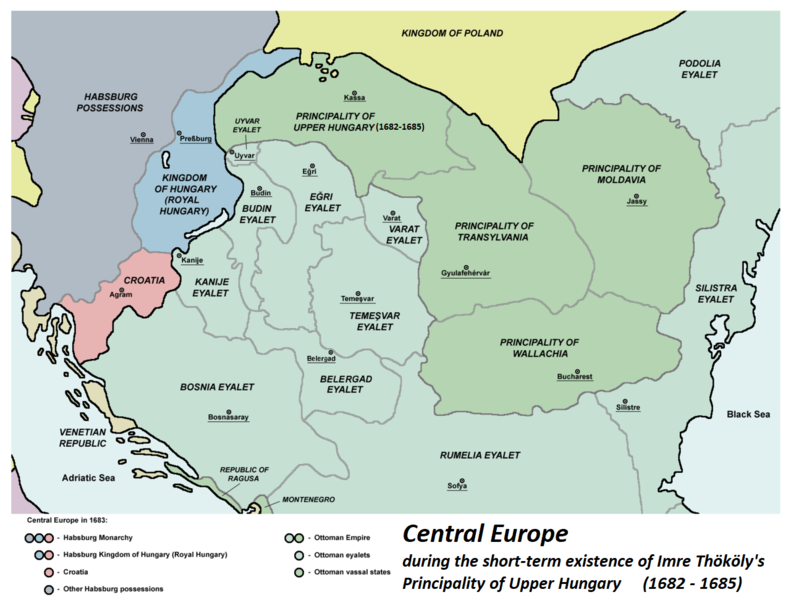
«Central Europe in 1683 - Habsburg and Ottoman territories, including Habsburg Kingdom of Hungary (Royal Hungary) and Habsburg Croatia, Ottoman vassal states and Ottoman eyalets»
PANONIAN (Wikipedia) http://creativecommons.org/publicdomain/zero/1.0/deed.en

«Growth of Habsburg territories» http://www.heritage-history.com/maps/philips/phil025a.jpg

«Map of Europe, showing the major events of 1848 and 1849» Dahn (Wikipedia) http://creativecommons.org/licenses/by-sa/3.0/deed.en

«The ethnic groups of Austria-Hungary in 1910. Based on "Distribution of Races in Austria-Hungary" from the Historical Atlas by William R. Shepherd, 1911» Andrein (Wikipedia)

«Austria-Hungary 1914, physical/Mapa» Mariusz Paździora (Wikipedia) http://creativecommons.org/licenses/by/3.0/deed.en

«Drafted borders of Austria-Hungary in the Treaty of Trianon» The Independent, New York, June 14, volume 98, 1919, page 391 http://ecuip.lib.uchicago.edu/diglib/social/chi1919/aline/a1/a1mapb.bmp.gif
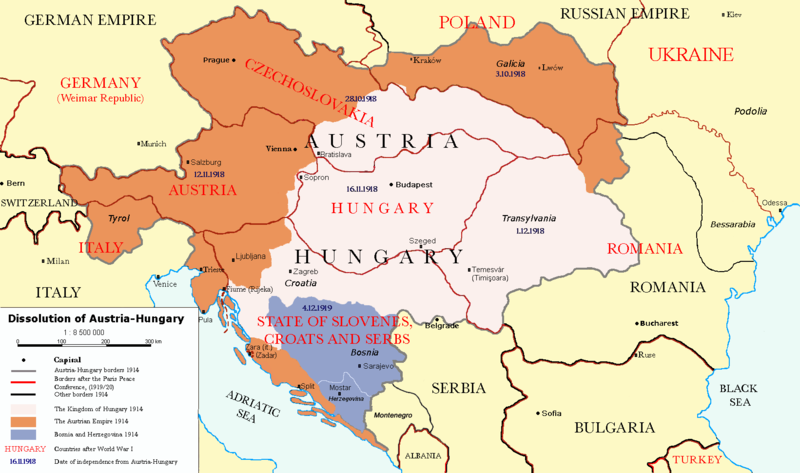
«The end of Austria-Hungary after the Paris Treaty.» AlphaCentauri (Wikipedia) http://creativecommons.org/licenses/by-sa/3.0/deed.en

«Teritorial gains by Hungary durring WW2» PANONIAN (Wikipedia) http://creativecommons.org/licenses/by-sa/3.0/deed.en
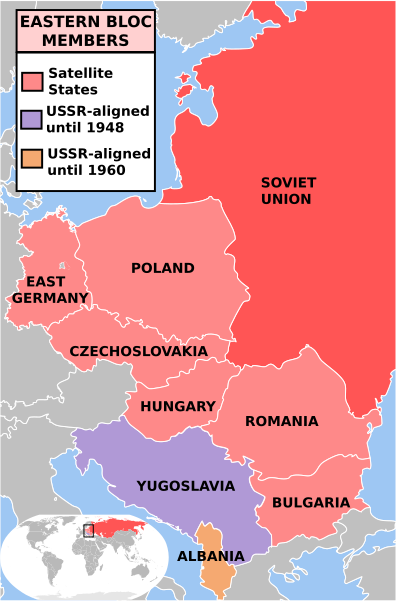
«The Eastern Bloc by Mosedschurte» (Wikipedia) http://creativecommons.org/licenses/by-sa/3.0/deed.en
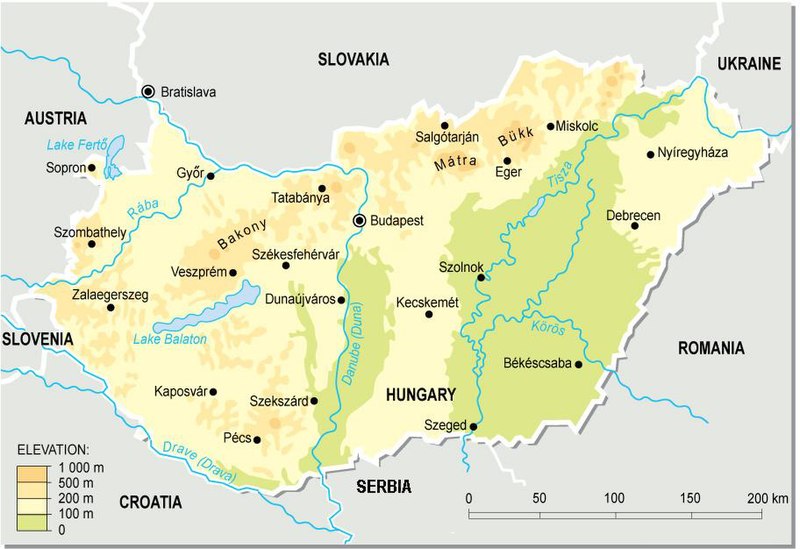
«Topographic map of Hungary» Cserlajos (Wikipedia)
...
Threats against Democracy go on in Hugary after a coligation with a strong majority win elections of 2010 that implicate the reaction of European Parliament;
http://www.europarl.europa.eu/sides/getDoc.do?pubRef=-//EP//TEXT+TA+P7-TA-2013-0315+0+DOC+XML+V0//EN&language=EN
European Parliament resolution of 3 July 2013 on the situation of fundamental rights: standards and practices in Hungary (pursuant to the European Parliament resolution of 16 February 2012)
«(...) Recommendations to the Hungarian Authorities
72. Urges the Hungarian authorities to implement as swiftly as possible all the measures the European Commission as the guardian of the treaties deems necessary in order to fully comply with EU law, fully comply with the decisions of the Hungarian Constitutional Court and implement as swiftly as possible the following recommendations, in line with the recommendations of the Venice Commission, the Council of Europe and other international bodies for the protection of the rule of law and fundamental rights, with a view to fully complying with the rule of law and its key requirements on the constitutional setting, the system of checks and balances and the independence of the judiciary, as well as on strong safeguards for fundamental rights, including freedom of expression, the media and religion or belief, protection of minorities, action to combat discrimination, and the right to property:
On the Fundamental Law:
| – | to fully restore the supremacy of the Fundamental Law by removing from it those provisions previously declared unconstitutional by the Constitutional Court; | |
| – | to reduce the recurrent use of cardinal laws in order to leave policy areas such as family, social, fiscal and budget matters to ordinary legislation and majorities; | |
| – | to implement the recommendations of the Venice Commission and, in particular, to revise the list of policy areas requiring a qualified majority with a view to ensuring meaningful future elections; | |
| – | to secure a lively parliamentary system which also respects opposition forces by allowing a reasonable time for a genuine debate between the majority and the opposition and for participation by the wider public in the legislative procedure; | |
| – | to ensure the widest possible participation by all
parliamentary parties in the constitutional process, even though the
relevant special majority is held by the governing coalition alone; On checks and balances: | |
| – | to fully restore the prerogatives of the Constitutional Court as the supreme body of constitutional protection, and thus the primacy of the Fundamental Law, by removing from its text the limitations on the Constitutional Court's power to review the constitutionality of any changes to the Fundamental Law, as well as the abolition of two decades of constitutional case law; to restore the right of the Constitutional Court to review all legislation without exception, with a view to counterbalancing parliamentary and executive actions and ensuring full judicial review; such a judicial and constitutional review may be exerted in different ways in different Member States, depending on the specificities of each national constitutional history, but once established, a Constitutional Court – like the Hungarian one, which after the fall of the communist regime has rapidly built a reputation among Supreme Courts in Europe – should not be subject to measures aimed at reducing its competences and thus undermining the rule of law; | |
| – | to restore the possibility for the judicial system to refer to the case law issued before the entry into force of the Fundamental Law, in particular in the field of fundamental rights ; | |
| – | to strive for consensus when electing the members of the Constitutional Court, with meaningful involvement of the opposition, and to ensure that the members of the court are free from political influence; | |
| – | to restore the prerogatives of the parliament in the budgetary field and thus secure the full democratic legitimacy of budgetary decisions by removing the restriction of parliamentary powers by the non-parliamentary Budget Council; | |
| – | to cooperate with the European institutions in order to ensure that the provisions of the new National Security Law comply with the fundamental principles of the separation of powers, the independence of the judiciary, respect for private and family life and the right to an effective remedy; | |
| – | to provide clarifications on how the Hungarian
authorities intend to remedy the premature termination of the term of
office of senior officials with a view to securing the institutional
independence of the data protection authority; On the independence of the judiciary: | |
| – | to fully guarantee the independence of the judiciary by ensuring that the principles of irremovability and guaranteed term of office of judges, the rules governing the structure and composition of the governing bodies of the judiciary and the safeguards on the independence of the Constitutional Court are enshrined in the Fundamental Law; | |
| – | to promptly and correctly implement the abovementioned decisions of the Court of Justice of the European Union of 6 November 2012 and of the Hungarian Constitutional Court, by enabling the dismissed judges who so wish to be reinstated in their previous positions, including those presiding judges whose original executive posts are no longer vacant; | |
| – | to establish objective selection criteria, or to mandate the National Judicial Council to establish such criteria, with a view to ensuring that the rules on the transfer of cases respect the right to a fair trial and the principle of a lawful judge; | |
| – | to implement the remaining recommendations laid down in
the Venice Commission's Opinion No CDL-AD(2012)020 on the cardinal acts
on the judiciary that were amended following the adoption of Opinion
CDL-AD(2012)001; On the electoral reform: | |
| – | to invite the Venice Commission and the OSCE/ ODIHR to carry out a joint analysis of the comprehensively changed legal and institutional framework of the elections and to invite the ODIHR for a Needs Assessment Mission and a long and short term election observation. | |
| – | to ensure balanced representation within the National Election Committee; On the media and pluralism: | |
| – | to fulfil the commitment to further discuss cooperation activities at expert level on the more long-term perspective of the freedom of the media, building on the most important remaining recommendations of the 2012 legal expertise of the Council of Europe; | |
| – | to ensure timely and close involvement of all relevant stakeholders, including media professionals, opposition parties and civil society, in any further review of this legislation, which regulates such a fundamental aspect of the functioning of a democratic society, and in the process of implementation; | |
| – | to observe the positive obligation arising from European Court of Human Rights jurisprudence under Article 10 ECHR to protect freedom of expression as one of the preconditions for a functioning democracy; | |
| – | to respect, guarantee, protect and promote the fundamental right to freedom of expression and information, as well as media freedom and pluralism, and to refrain from developing or supporting mechanisms that threaten media freedom and journalistic and editorial independence; | |
| – | to make sure that objective, legally binding procedures and mechanisms are in place for the selection and appointment of heads of public media, management boards, media councils and regulatory bodies, in line with the principles of independence, integrity, experience and professionalism, representation of the entire political and social spectrum, legal certainty and continuity; | |
| – | to provide legal guarantees regarding full protection of the confidentiality-of-sources principle and to strictly apply related European Court of Human Rights case law; | |
| – | to ensure that rules relating to political information
throughout the audiovisual media sector guarantee fair access to
different political competitors, opinions and viewpoints, in particular
on the occasion of elections and referendums, allowing citizens to form
their own opinions without undue influence from one dominant
opinion-forming power; On respect for fundamental rights, including the rights of persons belonging to minorities: | |
| – | to take, and continue with, positive actions and effective measures to ensure that the fundamental rights of all persons, including persons belonging to minorities and homeless persons, are respected and to ensure their implementation by all competent public authorities; when reviewing the definition of ‘family’, to take into account the legislative trend in Europe to broaden the scope of the definition of family and the negative impact of a restricted definition of family on the fundamental rights of those who will be excluded by the new and more restrictive definition; | |
| – | to take a new approach, finally assuming its responsibilities towards homeless – and therefore vulnerable – people, as set out in the international treaties on human rights to which Hungary is a signatory, such as the European Convention on Human Rights and the Charter of Fundamental Rights of the European Union, and thus to promote fundamental rights rather than violating them by including in its Fundamental Law provisions that criminalise homeless people; | |
| – | calls on the Hungarian Government to do all in its power to strengthen the mechanism for social dialogue and comprehensive consultation and to guarantee the rights associated with this; | |
| – | calls on the Hungarian Government to increase its
efforts to integrate the Roma and to lay down targeted measures to
ensure their protection. Racist threats directed at the Roma must be
unequivocally and resolutely repelled; On freedom of religion or belief and recognition of churches: | |
| – | to establish clear, neutral and impartial requirements and institutional procedures for the recognition of religious organisations as churches, which respect the duty of the State to remain neutral and impartial in its relations with the various religions and beliefs and to provide effective means of redress in cases of non-recognition or lack of a decision, in line with the constitutional requirements set out in the abovementioned Decision 6/2013 of the Constitutional Court; |
Recommendations to the EU institutions on setting up a new mechanism to enforce Article 2 TEU effectively
73. Reiterates the urgent need to tackle the so-called ‘Copenhagen dilemma’, whereby the EU remains very strict with regard to compliance with the common values and standards on the part of candidate countries but lacks effective monitoring and sanctioning tools once they have joined the EU;
74. Firmly requests that Member States be regularly assessed on their continued compliance with the fundamental values of the Union and the requirements of democracy and the rule of law, avoiding any double standards and bearing in mind that such an assessment must be founded on a commonly accepted European understanding of constitutional and legal standards; firmly requests, furthermore, that similar situations in Member States should be monitored in accordance with the same pattern, since otherwise the principle of equality of the Member States before the Treaties is not respected;
75. Calls for closer cooperation between Union institutions and other international bodies, particularly the Council of Europe and the Venice Commission, and for use to be made of their expertise in upholding the principles of democracy, human rights and the rule of law;
76. Acknowledges and welcomes the initiatives undertaken, the analysis conducted and the recommendations issued by the Council of Europe, in particular its Secretary General, Parliamentary Assembly, Commissioner for Human Rights and the Venice Commission;
77. Calls on all the EU institutions to launch a joint reflection and debate – as also requested by the Ministers of Foreign Affairs of Germany, the Netherlands, Denmark and Finland in their abovementioned letter to the Commission President – on how to equip the Union with the necessary tools to fulfil its Treaty obligations on democracy, the rule of law and fundamental rights, while avoiding any risks of applying double standards among its Member States;
78. Considers that a future revision of the Treaties should lead to a better distinction between an initial phase, aimed at assessing any risks of a serious breach of the values referred in Article 2 TEU, and a more efficient procedure in a subsequent phase, where action would need to be taken to address actual serious and persistent violation of those values;
79. Given the current institutional mechanism laid down in Article 7 TEU, reiterates the calls it made, in its resolution of 12 December 2012 on the situation of fundamental rights in the European Union (2010- 2011), for the establishment of a new mechanism to ensure compliance by all Member States with the common values enshrined in Article 2 TEU, and the continuity of the ‘Copenhagen criteria’; this mechanism could assume the form of a ‘Copenhagen Commission’ or high-level group, a ‘group of wise men’ or an Article 70 TFEU evaluation, and build up on the reforming and strengthening of the mandate of the European Union Agency for Fundamental Rights, and on the framework of a strengthened Commission-Council-European Parliament-Member States dialogue on measures to be taken;
80. Reiterates that the setting up of such a mechanism could involve a rethinking of the mandate of the European Union Agency for Fundamental Rights, which should be enhanced to include regular monitoring of Member States' compliance with Article 2 TEU; recommends that such a ‘Copenhagen high-level group’ or any such mechanism should build on and cooperate with existing mechanisms and structures; recalls the role of the European Union Agency for Fundamental Rights, which could bring together the highly valuable work of the various existing Council of Europe monitoring bodies and the Agency's own data and analysis in order to carry out independent, comparative and regular assessments of the EU Member States' compliance with Article 2 TEU.
81. Recommends that this mechanism should:
| – | be independent from political influence, as all European Union mechanisms which relate to monitoring Member States should be, as well as swift and effective; | |
| – | operate in full cooperation with other international bodies as regards the protection of fundamental rights and the rule of law; | |
| – | regularly monitor respect for fundamental rights, the state of democracy and the rule of law in all Member States, while fully respecting national constitutional traditions; | |
| – | conduct such monitoring uniformly in all Member States to avoid any risks of double standards among its Member States; | |
| – | warn the EU at an early stage about any risks of deterioration of the values enshrined in Article 2 TEU; | |
| – | issue recommendations to the EU institutions and Member States on how to respond and remedy any deterioration of the values enshrined in Article 2 TEU; |
82. Instructs its committee responsible for the protection within the territory of the Union of citizens' rights, human rights and fundamental rights, and for determining clear risks of a serious breach by a Member State of the common principles, to submit a detailed proposal in the form of a report to the Conference of Presidents and to the Plenary;
83. Instructs its committee responsible for the protection within the territory of the Union of citizens' rights, human rights and fundamental rights, and for determining clear risks of a serious breach by a Member State of the common principles, as well as its committee responsible for the determination of the existence of a serious and persistent breach by a Member State of the principles common to the Member States, to follow the development of the situation in Hungary;
84. Intends to convene a Conference on this issue before the end of 2013 that will bring together representatives from the Member States, the European institutions, the Council of Europe, national Constitutional and Supreme Courts, the Court of Justice of the European Union and the European Court of Human Rights;
(...)»
Since the admin of this web page is working, no doubt very shortly it will
ResponderEliminarbe well-known, due to its feature contents.
my weblog - seo, ,